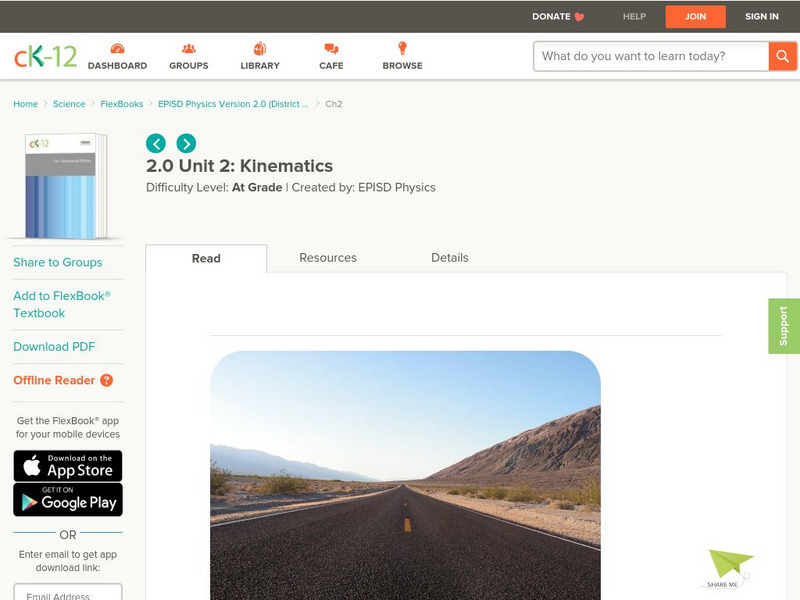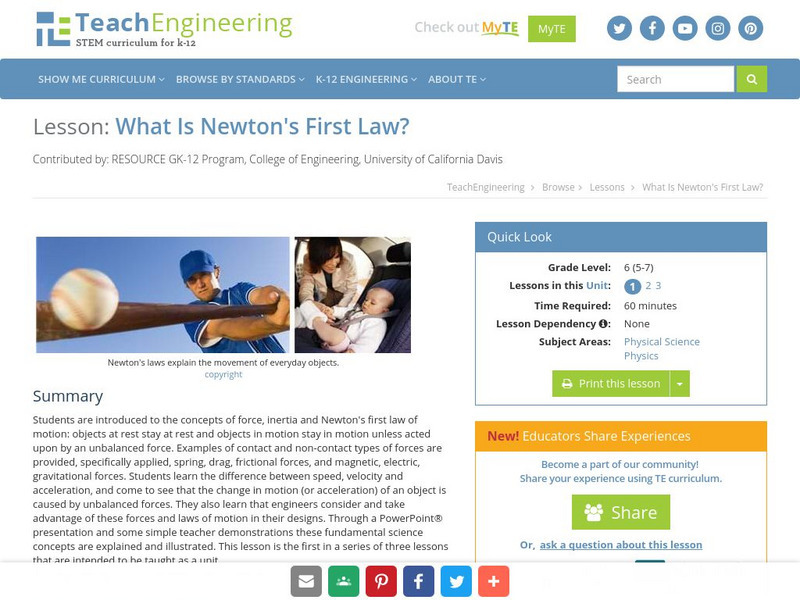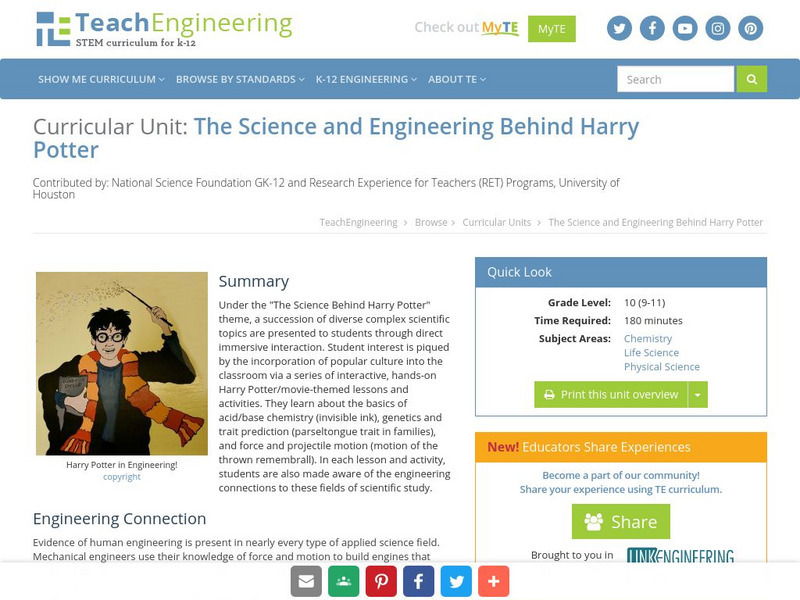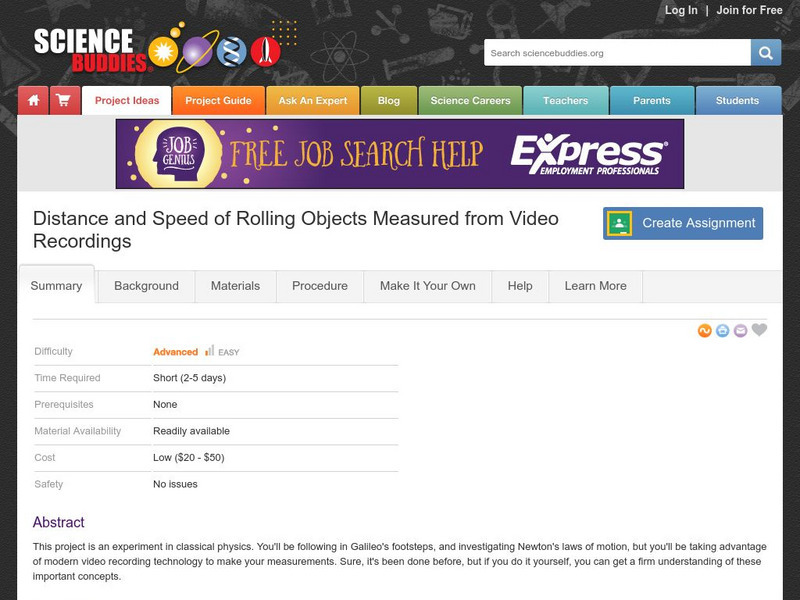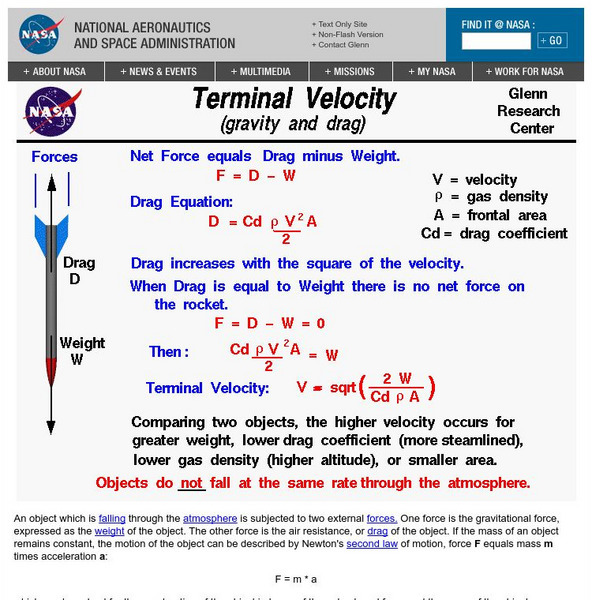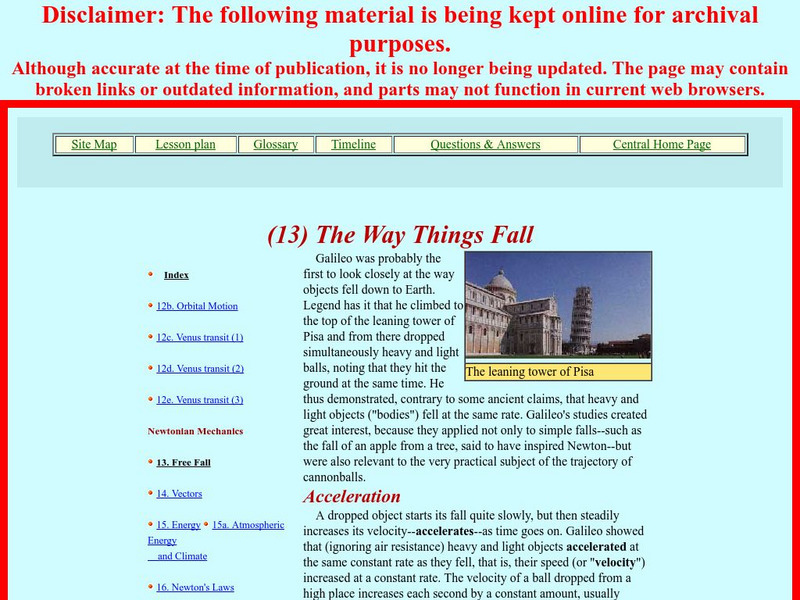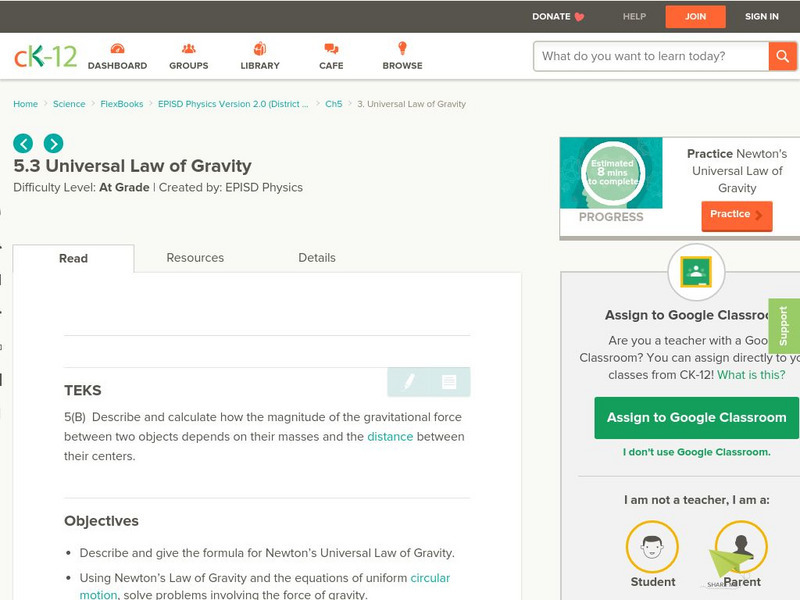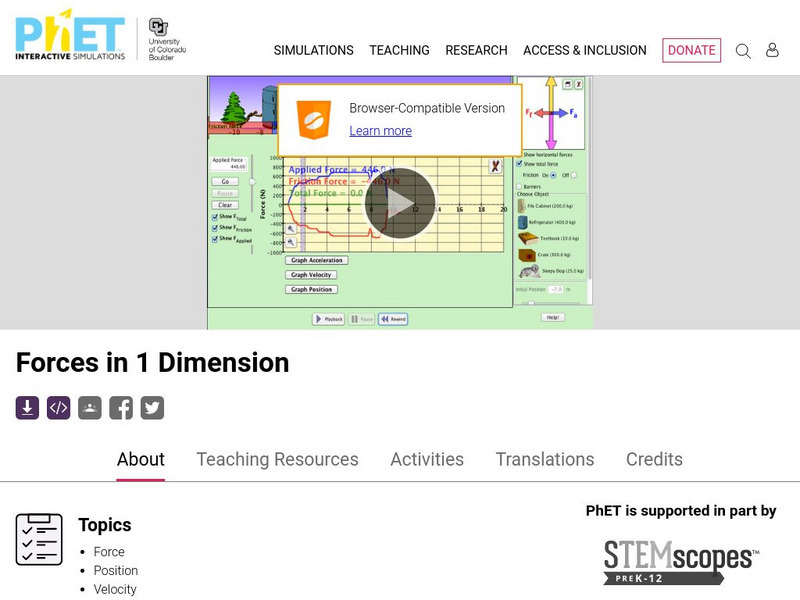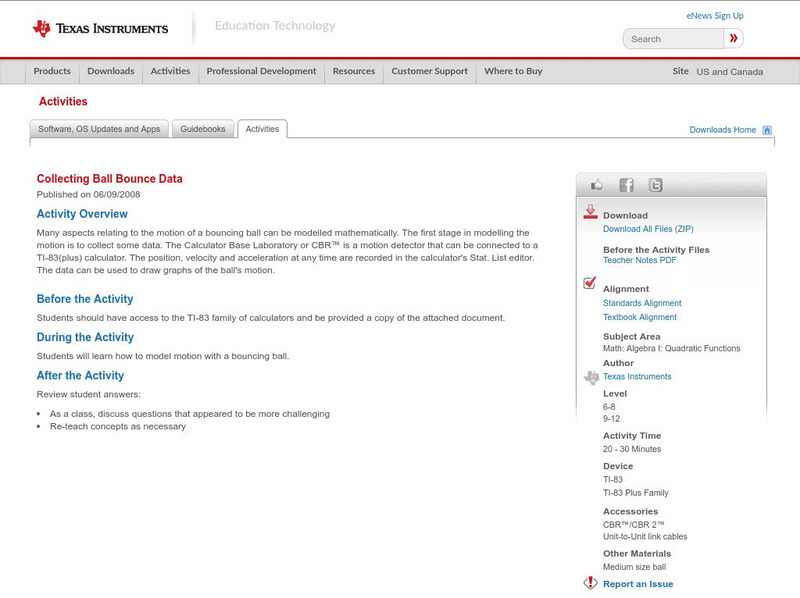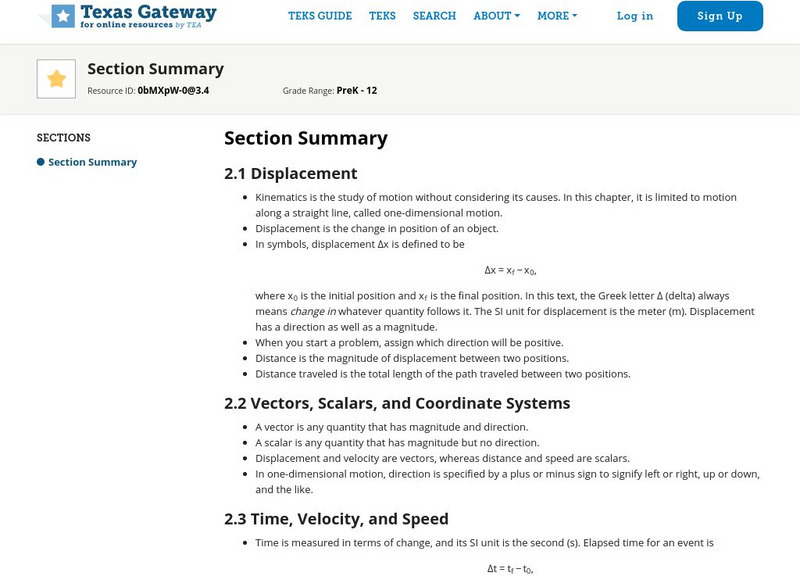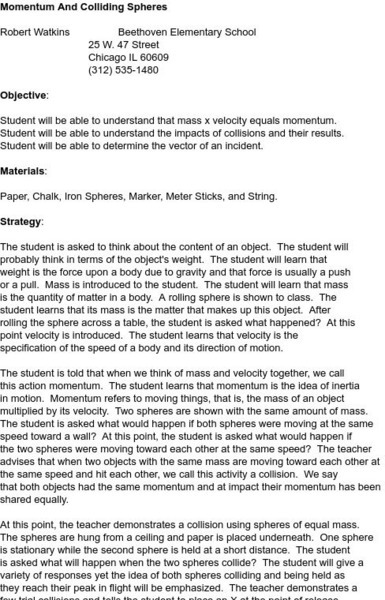CK-12 Foundation
Ck 12: Episd: Physics: Kinematics
[Free Registration/Login may be required to access all resource tools.] An online chapter focused on motion and the shapes it takes. Topics range from speed and velocity to acceleration and free fall. Find detailed visuals, learning...
TeachEngineering
Teach Engineering: Projectile Magic
Learners watch video clips from October Sky and Harry Potter and the Sorcerer's Stone to learn about projectile motion. They explore the relationships between displacement, velocity and acceleration and calculate simple projectile...
TeachEngineering
Teach Engineering: Physics of the Flying T Shirt
Students are introduced to the physics concepts of air resistance and launch angle as they apply to catapults. This includes the basic concepts of position, velocity and acceleration and their relationships to one another. They use...
TeachEngineering
Teach Engineering: What Is Newton's First Law?
Students are introduced to the concepts of force, inertia, and Newton's first law of motion: objects at rest stay at rest and objects in motion stay in motion unless acted upon by an unbalanced force.This lesson is the first in a series...
TeachEngineering
Teach Engineering: Engineering Out of Harry Situations
Under the "The Science Behind Harry Potter" theme, a succession of diverse complex scientific topics are presented to students through direct immersive interaction. Student interest is piqued by the incorporation of popular culture into...
Science Buddies
Science Buddies: Distance and Speed of Rolling Objects
This project is an experiment in classical physics. You'll be following in Galileo's footsteps, and investigating Newton's laws of motion, but you'll be taking advantage of modern video recording technology to make your measurements. The...
NASA
Nasa: Beginner's Guide to Aerodynamics
This site from NASA uses a colorful graphic to illustrate why objects reach terminal velocity. Provides equation for the terminal velocity of an object. Graphic is accompanied by a simple explanation.
NASA
Nasa: The Way Things Fall
This site from NASA compares free falling motion to falling with air resistance. Discusses Galileo's experiment. Explains why we believe all objects free fall with the same acceleration.
Walter Fendt
Walter Fendt: Movimiento Con Aceleracion Constante
A short interactive activity which allows you to visualize a constant acceleration. You can modify the initial position, the initial velocity and the acceleration.
Cosmo Learning
Cosmo Learning: Physics 240: Science and Engineering I
A collection of video lectures from a physics for science and engineering course taught at the University of Missouri-Kansas City. The course discusses the concepts of mechanics, wave motion, sound, heat and thermodynamics in thirty-five...
CK-12 Foundation
Ck 12: Universal Law of Gravity
[Free Registration/Login may be required to access all resource tools.] In this online tutorial students will learn to describe and calculate how the magnitude of the gravitational force between two objects depends on their masses and...
Stanford University
Stanford University: Conventionality of Simultaneity
This site from Stanford University is on the topic of simultaneity in relativity.
University of Colorado
University of Colorado: Ph Et Interactive Simulations: Forces in One Dimension
Use this simulation to see the results of applying a force to move an object. Analyze forces and friction using graphs.
Texas Instruments
Texas Instruments: Collecting Ball Bounce Data
Many aspects relating to the motion of a bouncing ball can be modelled mathematically. The first stage in modelling the motion is to collect some data. The Calculator Base Laboratory or CBR is a motion detector that can be connected to a...
Other
Institute of Physics: Practical Physics: Investigate Mass on Spring Oscillators
This experiment allows the period, displacement, velocity, and acceleration of a mass suspended on a spring to be investigated by data logging the output from a motion sensor. It is an example of simple harmonic motion.
Texas Instruments
Texas Instruments: Good Vibrations
In this activity, students will investigate the motion of a mass moving up and down on a spring. They collect data for the position, velocity, and acceleration of the mass's motion and examine the relationship between them.
Texas Education Agency
Texas Gateway: Kinematics Section Summary
This is a summary of the main topics for AP Physics Chapter 2 Kinematics. These include Displacement; Vectors, Scalars, and Coordinate Systems; Time, Velocity, and Speed; Acceleration; Motion Equations for Constant Acceleration in One...
Physics Aviary
Physics Aviary: Newton's Law Lab
This lab was designed to have students investigate the factors that affect the acceleration of an object on a frictionless horizontal surface. The simulation will give the students a position vs. time graph and a velocity vs. time graph....
Physics Classroom
The Physics Classroom: 1 D Kinematics: Kinematic Equations/problem Solving
In this tutorial, investigate the process of using the equations to determine unknown information about an object's motion.
Other
Fearof Physics: Videos
Looking for some more explanantion on a topic covered in physics class? This site contains videos that explore some physics concepts. Videos are broken down by topics. Some videos also give examples on how to solve problems.
Educaplus (Jesús Peñas Cano)
Educaplus: Estudio De Los Movimientos
This site shows a cinematic study of rectilinear movements which requires the use of equations and graphs. Every day life applications are also shown.
Physics Classroom
The Physics Classroom: Kinetic Energy
Kinetic energy is defined and explained--learning exercises are included to assess your understanding.
Science and Mathematics Initiative for Learning Enhancement (SMILE)
Smile: Colliding Spheres
This lab activity from the Illinois Institute of Technology lets students investigate the impact of collisions upon the velocity and momentum of the colliding objects. Requires understanding of vectors.
Khan Academy
Khan Academy: What Is a Centripetal Force?
Learn what centripetal forces are and how to calculate them. Included are two problems with the solutions provided.


